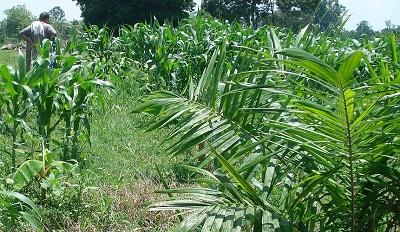
On August 19, 2015, unknown men followed human rights activist William Aljure in Villavicencio, Colombia, a town about a three-hour drive from the capital, Bogotá. Aljure had recently traveled to Washington, D.C. to raise awareness of forced, violent displacement of rural communities by multinational palm oil corporation Poligrow. Poligrow has illegally accumulated up to 79,000 hectares of land in Colombia, including land from small-scale farmers, Afro-Colombian and indigenous communities.
Despite well-documented human rights violations, the Colombian government promotes the palm industry as a critical source of employment. Between 130,000 and 140,000 people work in the sector, both directly and indirectly, under exploitative and often illegal conditions. According to the Ministry of Agriculture, Colombia plans to expand its plantations from 7.1 million to 8.1 million hectares of land from 2016 to 2019.
In fact, palm oil is one of the fastest growing export crops in the world. Palm oil plantations are spreading across Latin America, Africa, and Asia as large corporations seek to grab tracts of land for production of the profitable vegetable oil. Globally, Colombia is the fourth largest producer of palm oil, after Indonesia, Malaysia and Thailand, where similar abuses are also endemic to the industry.
Since 2013, ILRF has worked with environmental and indigenous rights organizations to denounce palm oil expansion that harms local communities and workers in Asia. We believe it’s critical to highlight similar dynamics in Latin America (especially in Colombia, Honduras and Guatemala) and expose the reality of how the industry treats its workers.
For example, in contrast to positive government rhetoric, employees of Colombian palm company Poligrow say they have suffered from wage theft, work-related injuries, and denials of their rights to collective bargaining and medical care. According to CIJP a Poligrow worker who was injured on the job in 2011, Pedro Pablo Escobar, has been fighting in court since 2013 for legal recognition of his disability as work-related. Poligrow workers interviewed by CIJP for a report published in 2015 stated that their pay often did not match their actual hours worked. Palma de Tumaco, another palm oil corporation in Colombia’s Pacific region, reportedly pays laborers as little as two dollars per day (the monthly minimum wage is about $225 at the current exchange rate).
Like thousands of Colombian employers, palm oil companies aggressively use exploitative contracting schemes to cut labor costs and undermine workers’ rights. Poligrow relies on so-called “worker cooperatives” and “simplified stock corporations” – sub-contractors created by the company to avoid unions and the expenses of hiring workers directly, like social security benefits. According to a 2015 report by the NGOs Somo and Indepaz, over half of Poligrow’s workforce in July 2014 had been hired indirectly.
Under a U.S. backed Labor Action Plan intended to strengthen labor rights enforcement, companies should be fined for certain forms of sub-contracting, but an October 2015 report by the Coalition of Black Trade Unionists (CBTU) stated that fines had yet to be collected. Essentially, failed enforcement of indirect hiring laws makes collective bargaining nearly impossible for most Colombian palm oil workers.
In this already hostile environment, corporate links to paramilitary organizations also keep workers too afraid to organize. In many areas of Colombia, trade union activism on palm plantations is downright dangerous. The ILO and Solidarity Center estimate that at least 150 union leaders have been murdered in the palm oil industry since 1998. According to Escuela Nacional Sindical (ENS) and Human Rights Watch, between 2011 and August 2015, Colombian workers suffered over 1,933 threats and acts of violence – including more than 121 assassinations of union leaders.
Workers and activists have fought palm companies’ abuses in a range of ways, from waging local strikes to seeking international support. In 2015, rights abuses by Poligrow came to the attention of the Roundtable on Sustainable Palm Oil (RSPO) – which requires companies to uphold social and environmental standards – following the release of a documentary made by CIJP and the Environmental Investigation Agency. In October 2015 the RSPO announced that it was investigating the film’s allegations, although Poligrow will remain an RSPO member during the process.
Last year, ILRF led a coalition of organizations in developing a set of recommendations known as Free and Fair Labor in Palm Oil Production: Principles and Implementation Guidance to envision how an industry that respects workers’ rights would look. In this way, ILRF pushes back against the narrative that palm oil provides desperately needed jobs to help “lift” people out of poverty, and offers an alternative model for corporate accountability. To find out more, check out ILRF’s palm oil campaign page and take action!

